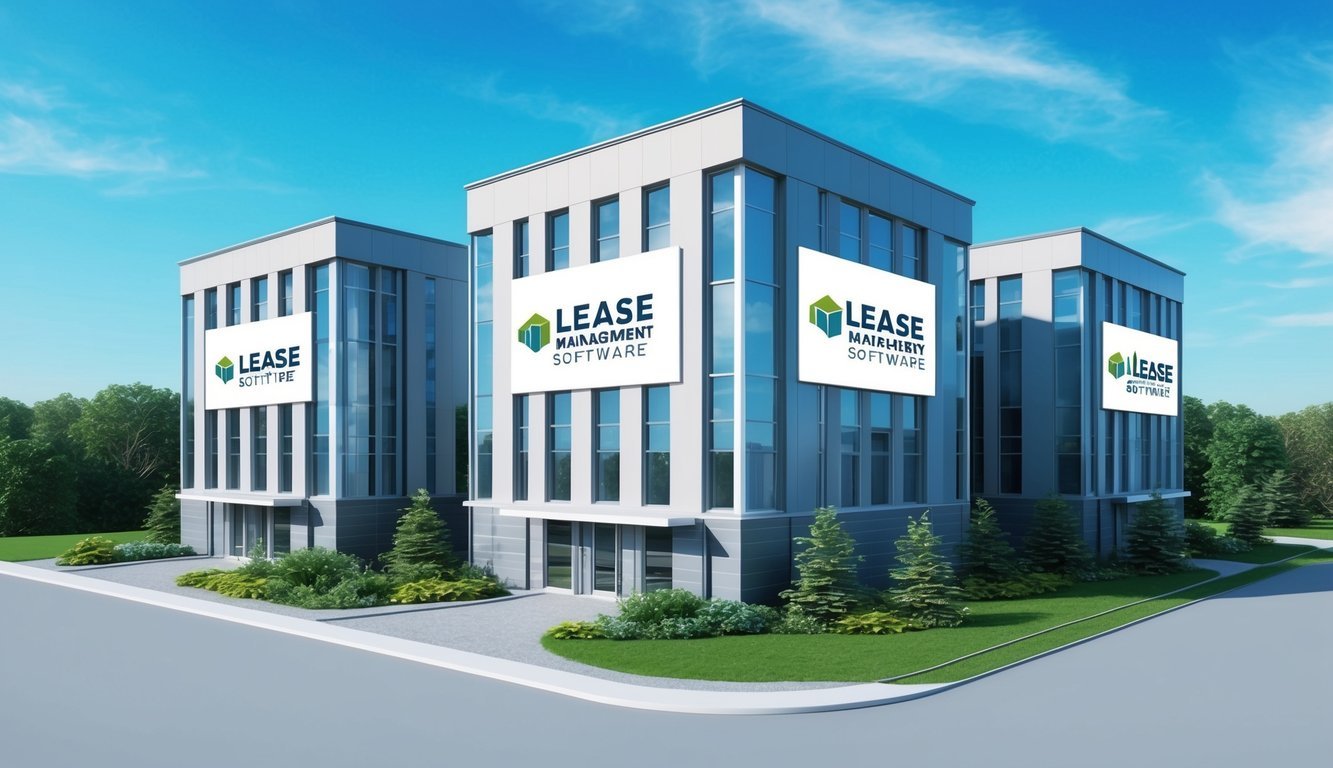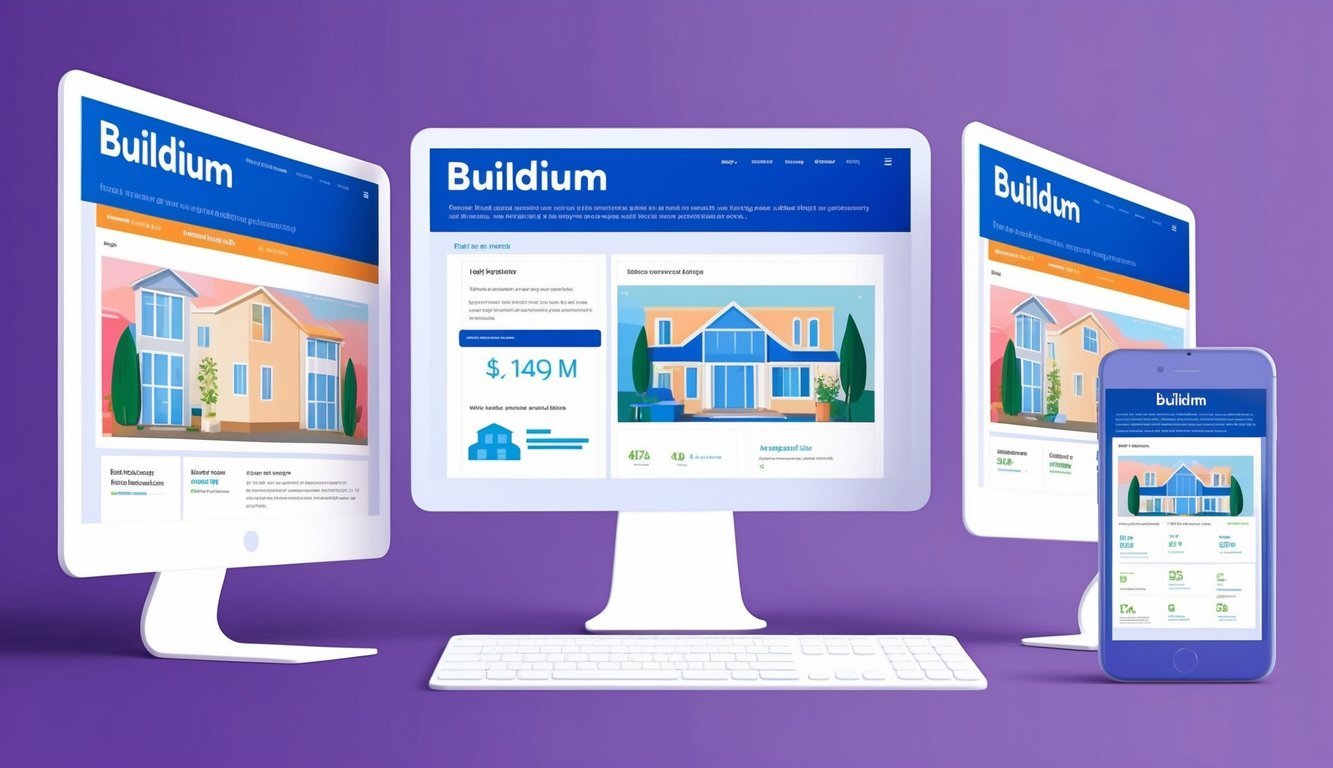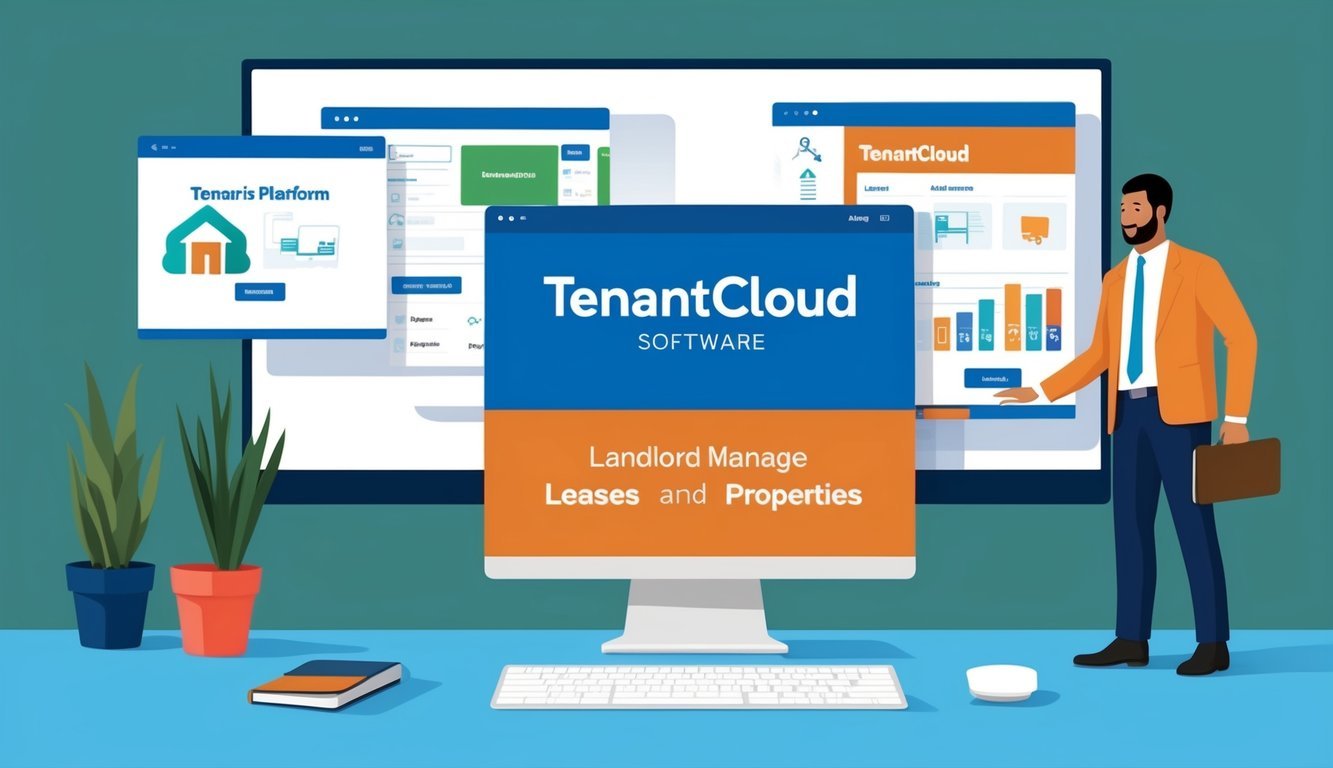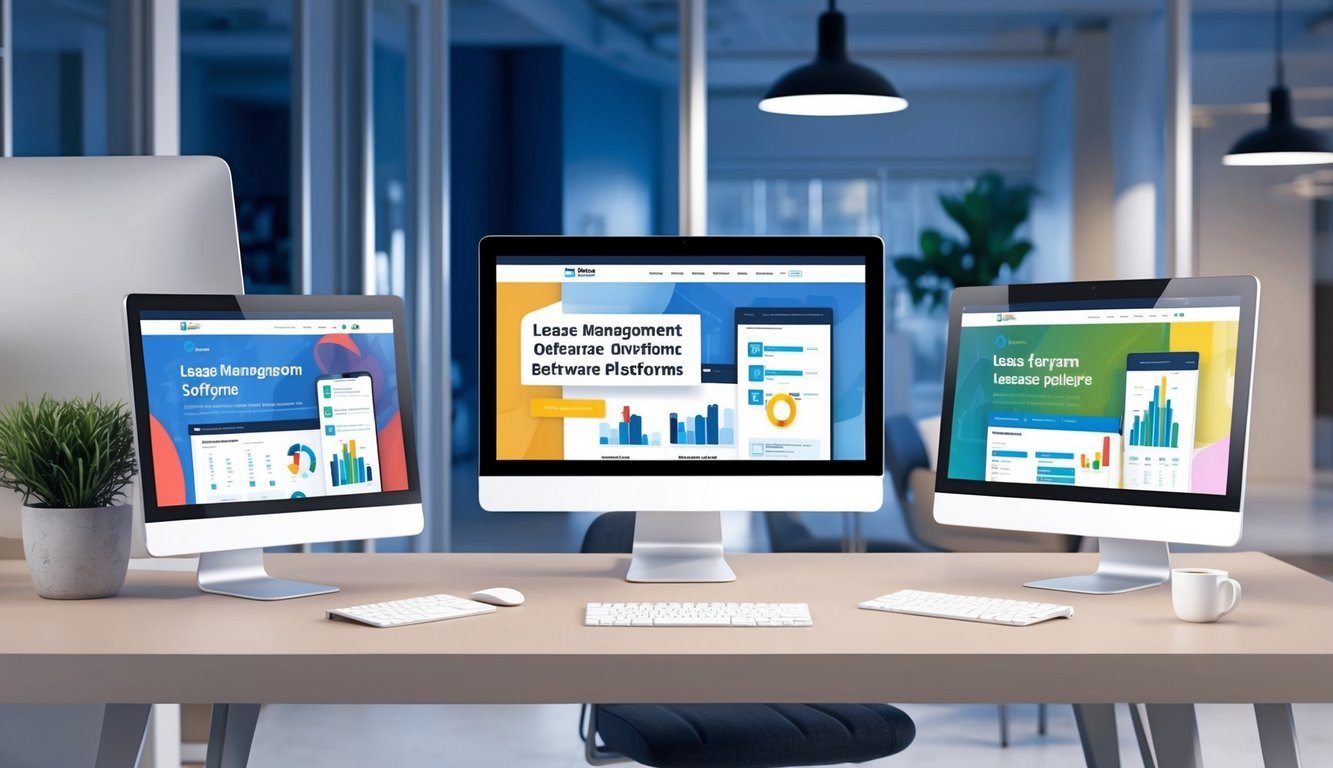In the competitive world of real estate, landlords need to manage leases effectively.
You need tools that streamline the administration of leases to handle multiple properties with ease.

Lease management software can provide the efficiency and organization you require to keep everything running smoothly. These platforms offer features that help manage tenant information, rent collections, and compliance, making your job significantly easier.
Explore the options available to find the best fit for your real estate needs.
1) AppFolio Property Manager
AppFolio Property Manager offers comprehensive tools for landlords seeking efficient lease management solutions.
This platform provides a fully integrated system that streamlines the leasing process.
With features like flexible showing options and online applications, you can manage multiple properties with ease.
Automation-driven workflows reduce manual tasks, freeing up more time to focus on tenant interactions.
The software supports tasks from lead-to-lease, ensuring a seamless transition for potential renters.
It offers intuitive navigation for tracking applications, conducting tenant screenings, and processing lease agreements.
This helps landlords stay organized and proactive in managing their properties.
AppFolio also allows you to handle maintenance requests, streamline communication with tenants, and manage accounts effortlessly.
By centralizing these tasks, landlords can improve operational efficiency and tenant satisfaction.
To explore what AppFolio Property Manager can offer your real estate business, you can take advantage of their free demo.
2) Buildium

Buildium serves as an efficient lease management tool tailored for real estate landlords and property managers.
Its platform is designed to simplify the range of tasks associated with property management, making it a valuable asset for professionals in the real estate industry.
With a cloud-based infrastructure, Buildium offers features such as lease management, tenant screening, and rent collection.
These components ensure that your processes are streamlined, providing ease of use and accessibility across devices.
One significant advantage is the inclusion of automated bookkeeping and payment tools.
These features help you manage financial transactions seamlessly, reducing manual errors and enhancing efficiency.
For those managing residential properties, Buildium proves particularly beneficial.
Another highlight is the absence of a minimum unit count, which makes it a flexible choice for various portfolio sizes.
You can easily manage smaller properties without worrying about exceeding certain thresholds.
Unfortunately, its Essential plan does not include live support.
If comprehensive functionality is important to you, exploring Buildium’s platform could be beneficial for meeting your management needs.
3) TenantCloud

TenantCloud offers a comprehensive solution for property management with features that streamline various daily tasks.
As a landlord, you can utilize this platform to manage your properties effectively by listing vacancies and handling lease agreements digitally.
The integration of electronic signatures simplifies the process of securing lease terms with tenants.
The platform allows you to accept rent payments online, which is both convenient and secure.
Tenants can use credit or debit cards, as well as ACH transfers, to pay rent, reducing potential delays.
This not only minimizes the possibility of late fees but also improves communication with your tenants regarding financial transactions.
TenantCloud provides a dedicated portal for landlords, tenants, and service providers.
Through these portals, you can manage and track maintenance requests, ensuring that issues are resolved promptly.
This helps maintain a good relationship between you and your tenants by addressing their needs efficiently.
Moreover, you’ll have access to crucial financial data such as maintenance reports and reserve fund management, giving you a clearer overview of your property operations.
Offering seamless online tools, TenantCloud enhances your ability to oversee and maintain your rental properties effectively.
The platform is designed to help you focus on growth by simplifying complex property management tasks.
Importance of Lease Management Software

Effective lease management software is crucial for real estate landlords, allowing you to automate daily tasks, maintain clear tenant communication, and minimize paperwork.
This section highlights how these platforms can transform your operations.
Streamlining Operations
Lease management software helps optimize day-to-day operations by tracking key lease dates and automating routine tasks.
It allows you to set reminders for lease renewals and rent payments, ensuring that no deadlines are missed.
This automation reduces the risk of errors and enhances efficiency, giving you more time to focus on strategic decisions.
Many software solutions offer integrated tools for accounting and compliance.
This ensures financial data is accurate and up-to-date, which is essential for meeting legal requirements and making informed business decisions.
The integration also simplifies reporting processes, enabling you to generate detailed reports with ease.
Enhancing Tenant Communication
Effective communication with tenants is vital for managing properties successfully.
Lease management software provides platforms for streamlined interaction, such as portals for messaging and document sharing.
These tools allow you to quickly address tenant concerns and queries.
With features like automated email notifications and reminders, you can keep your tenants informed about upcoming rent payments or any maintenance work.
This proactive approach to communication helps build a positive relationship with tenants, improving tenant satisfaction and retention.
Clear documentation and easy access to lease agreements and related documents ensure both parties understand their rights and responsibilities, reducing potential disputes.
Reducing Administrative Burden
Managing multiple properties and leases can be administratively overwhelming.
Lease management software reduces this burden by centralizing all lease-related information in one location, making it easy to access and update records.
Automation of tasks such as rent collection and invoice generation further decreases the administrative workload.
This not only saves time but also minimizes the chances of human error, leading to more accurate financial management.
The software’s ability to generate detailed financial and operational reports without manual data entry significantly reduces paperwork and improves efficiency.
By making administrative tasks more manageable, you can allocate your focus to growing and improving your property portfolio.
Key Features to Consider

When selecting lease management software, focus on key features that enhance operational efficiency and tenant relationships.
Consider tools that streamline financial transactions and ensure compliance with legal requirements for a comprehensive management approach.
Automated Rent Collection
Automated rent collection is crucial for ensuring timely payments and reducing administrative tasks.
Look for software that allows tenants to set up recurring payments, send reminders, and track payment history.
This feature not only saves time but also minimizes errors and improves cash flow. Security should also be a priority, so ensure the platform complies with necessary encryption standards to protect sensitive financial data.
Additionally, the ability to integrate this function with other accounting tools enhances financial transparency and simplifies tax reporting.
Software that offers customizable reporting can provide insights into rent trends and tenant payment behaviors, aiding in strategic decision-making.
Document Management
Efficient document management is vital for maintaining organized records and ensuring compliance with local laws.
Choose software that supports digital storage, enabling you to easily access lease agreements, insurance policies, and tenant communication.
Look for features that offer secure sharing options and version tracking to streamline collaboration and audit trails.
Document management systems that incorporate e-signature capabilities are particularly beneficial, as they facilitate faster, legally binding contract executions without the need for physical meetings.
Such systems also enhance disaster recovery planning by providing safe, offsite storage for all critical documents.
Maintenance Tracking
An effective maintenance tracking system helps landlords address property issues swiftly, maintaining tenant satisfaction and property value.
Opt for software that enables tenants to submit maintenance requests online and automatically assigns tasks to maintenance personnel.
Real-time updates and communication logs are essential to keep everyone informed about the status of repairs.
Integration with mobile devices can enhance the responsiveness of on-the-ground teams, ensuring swift resolution of issues.
Additionally, having access to historical maintenance data helps in planning preventative maintenance, budgeting for future repairs, and identifying recurring issues, thus extending the lifespan of property assets.
Frequently Asked Questions

When choosing lease management software, it’s important to consider features, costs, and integration capabilities.
Each platform offers unique benefits that cater to different landlord needs.
What are the top features to look for in lease management software for real estate landlords?
Key features include automated lease tracking, rent collection, tenant screening, and accounting integration.
Platforms like AppFolio Property Manager offer intuitive interfaces and robust support for managing various real estate portfolios.
How does lease management software benefit small landlords?
Small landlords can manage their properties more efficiently by automating routine tasks, which reduces administrative burdens.
Platforms like TenantCloud provide tools for communication, document storage, and maintenance requests, making property management more manageable without requiring large teams.
Can landlords find free property management software, and if so, what are the limitations?
Yes, there are free options like TurboTenant.
These solutions typically offer basic features, such as tenant applications and listings, but may require upgrades for more comprehensive functionalities essential for managing a larger portfolio.
What should landlords expect to pay for premium lease management software platforms?
Premium lease management software may range from $25 to over $1,500 a month, depending on the scope of services and number of properties managed.
For instance, Buildium offers tiered pricing based on features and property count, which can greatly affect the total cost.
How are tenant management systems integrated into lease management software?
Tenant management systems are often integrated to streamline processes like rent collection, maintenance requests, and communication.
This integration enhances efficiency and makes tools like reminders and document uploads accessible directly within the platform, facilitating a seamless experience for both landlords and tenants.
What are the differences between property maintenance software and lease management software?
Property maintenance software focuses on tracking and managing physical property upkeep and repairs.
In contrast, lease management software encompasses the entire rental process, including lease agreements, tenant records, and rent collection.
While maintenance elements may be part of lease management platforms like Buildium, they are generally one aspect of broader functionalities.

